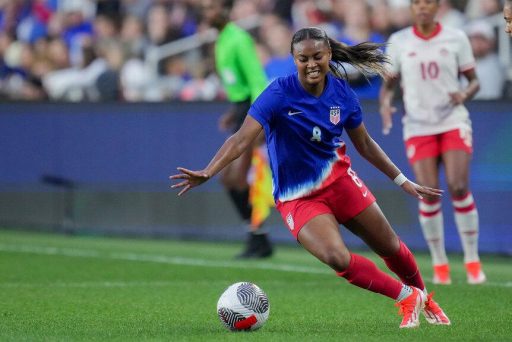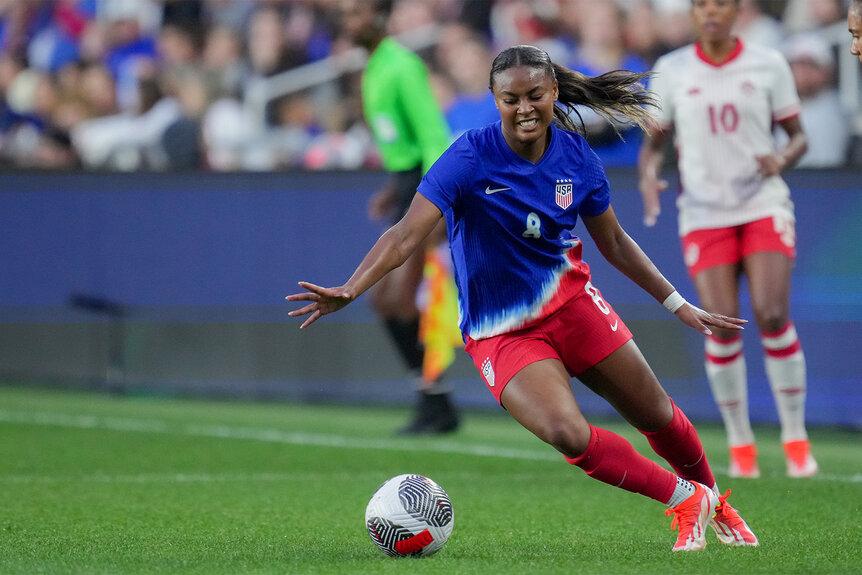Instant Access
No Waiting, Start Streaming Now
24/7 Support
Always Here to Help
Multi-Device
Watch on Any Screen
8K Quality
Crystal Clear Streaming


Instant Access
No Waiting, Start Streaming Now
24/7 Support
Always Here to Help
Multi-Device
Watch on Any Screen
8K Quality
Crystal Clear Streaming
As the anticipation builds for the 2026 FIFA World Cup, a clarion call has emerged from former players and pundits alike: the United States must adopt a newfound arrogance too truly compete on the global stage. This sentiment echoes through the corridors of American soccer, where pride frequently enough wrestles with pragmatism. In a sport where confidence frequently enough translates into performance, the notion of embracing a bolder, more assertive approach raises critical questions about national identity and the evolution of the game in the U.S. As we explore the intricate dynamics of competition and self-belief, we delve into what this ‘arrogance’ might entail and how it could shape the future trajectory of American soccer ahead of one of the most significant tournaments in the nation’s history.
in the world of competitive sports, especially on a stage as grand as the FIFA World Cup, a certain level of calculated arrogance can be the key to toppling the giants. For American soccer, this mindset isn’t about ego but about the confidence to walk into the arena knowing that victory isn’t just possible—it’s unavoidable. This attitude, frequently enough attributed to top-tier teams, demands more than talent. It calls for a belief system deeply embedded in players’ psyche,fostering resilience in the face of pressure and adversity. Without it, even the most skilled squads can crumble under the weight of expectation.
Adopting this perspective goes beyond individual players—it’s a culture shift that can influence every level of the game. To build this “arrogance”, U.S. Soccer needs to prioritize growth in these areas:
Take a look at how an arrogant belief in self stacks up against traditional confidence:
| Mindset Trait | Traditional Confidence | Calculated Arrogance |
|---|---|---|
| Response to Failure | Seeks to “bounce back” | Uses it as fuel for dominance |
| Approach to Competition | Respectful yet cautious | Bold and unapologetic |
| Preparation | focused on technique | Prioritizes confidence and control |
In a recent interview, Mauricio Pochettino emphasized that for the United States to elevate their game ahead of the 2026 World Cup, they need to embrace a certain level of calculated arrogance. The Chelsea boss,known for his approach to building player confidence,highlighted how the top footballing nations thrive on a mindset that borders on self-assured defiance. According to him, this isn’t about disrespecting opponents but an internal belief system that allows players to impose themselves on the pitch. He pointed out that underdog humility onyl takes teams so far in modern football,where mental strength and self-perception can be as impactful as technical skills.
He also offered a comparison to explain his beliefs. ”Look at players like Kylian Mbappé or lionel Messi at their peak—they have qualities of leadership that come from knowing they belong at the top. For the U.S., hosting the World Cup offers an unparalleled stage to adopt this mindset.” Below, we’ve summarized the differences in mindset Pochettino believes are needed:
| Current U.S. Mindset | Required Mindset |
|---|---|
| Focus on proving potential | Play as if winning is destiny |
| Defensive caution | Offensive aggression |
| Avoiding failure | Chasing greatness |
This philosophical pivot, as pochettino concludes, could be the factor that transforms the U.S. men’s squad from hopeful contenders to genuine worldbeaters in front of their home crowd.
When it comes to competing at the highest level in the 2026 World Cup, the U.S. Men’s National Team may benefit from adopting a touch of calculated arrogance. This isn’t about cockiness or overconfidence, but rather fostering a mindset that exudes boldness, self-assurance, and a refusal to be intimidated by global powerhouses. Top teams like Brazil and Germany thrive not only on skill but also on their unshakeable belief that they belong at the summit of world football. For the U.S., embracing this mental edge means staking a claim on the pitch and making it known that they’re ready to take risks and play fearlessly. A team’s mentality often sets the tone for their performance, and it’s high time the U.S. shed its underdog persona in favor of a commanding presence.
Consider this: the teams that consistently dominate international tournaments operate with an inherent belief in their identities and style of play. The U.S.already has several growing talents who can shift the narrative, and now, it’s about combining technical finesse with a psychological shift. Here’s a fast comparison of how mental confidence plays a role for different teams:
| Trait | Top World Cup Teams | U.S. Potential |
|---|---|---|
| Playing with confidence | Germany, Argentina | Emerging |
| Fearless tactics | Brazil, France | Inconsistent |
| Commanding respect | Italy, spain | Developing |
By fostering this culture of confidence, American players will be primed to leave their mark in what will undoubtedly be a historic tournament on home soil.
Fostering the right mindset in American soccer starts with instilling a “why not us?” mentality both on and off the field. Players need to develop swagger by believing in their ability to dominate, not just participate. Coaches and managers can amplify this by encouraging individuality while cultivating a team-first culture. Training sessions could include competitive drills where every action—passes, tackles, or shots—is measured, fueling a drive for personal and collective excellence. Simultaneously occurring,fans and media must play their part by holding higher expectations,celebrating bold performances,and embracing risks,even when the outcome isn’t perfect.
Leaders in the U.S. soccer system can also drive these cultural changes by investing in experiences that embed players into high-pressure environments. This can mean regular friendlies against world-class teams,participation in elite tournaments,or creating programs that send key talents to train abroad. Below is an example of initiatives that could amplify confidence and competitiveness in young players:
| initiative | Impact |
|---|---|
| Overseas Loan programs | Exposes players to top-tier leagues and cultures. |
| Mandatory Post-Game Reviews | Reinforces accountability and growth mindset. |
| grassroots Mentorships | Instills confidence by connecting youth with pros. |
The path to arrogance isn’t about dismissing humility; it’s about blending self-belief with preparation and competitive fire,ensuring the U.S. takes center stage confidently in 2026.
As we look toward the 2026 World Cup, it becomes increasingly clear that the path to success is not solely paved with skill and strategy, but also with a distinct attitude—one that balances humility with a necessary dose of arrogance. Pochettino’s insights remind us that in order to emerge not just as participants, but as contenders, the U.S. must embrace a mindset that reflects confidence and resilience.The world of soccer is unforgiving, and as the tournament approaches, the challenge will be to strike the right balance between respect for opponents and the self-assuredness to believe in one’s own abilities. If the U.S. can harness this spirit, it may just be the key to turning aspirations into achievements on the grandest stage in sport. As we gear up for 2026, the question remains: will the American team seize this possibility to redefine its identity and carve out a bold new chapter in its soccer history? Only time will tell, but one thing is certain: the gorgeous game is beckoning for a new level of ambition.
34,353
Live TV Channels
162,404
Movies
27,802
Series
284,023
Total Subscriptions
139,854
Users Online
142,887
Total Resellers

